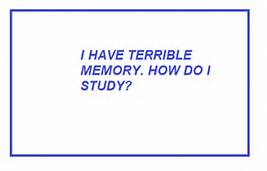I pondered what to write my blog about, as I have always been fascinated about Psychology, even as a little girl. Now what caught my eye was the section on Psychologist, Hermann Ebbinghaus, who was one of the first to study forgetting and wanted to determine how are memory is and the relation to forgetting what we try to learn. Good question right?
I have often wondered why I study so hard at times and seem to really know the material, especially if it is of a subject or topic I really like or am interested in knowing more about, but then somehow either forget key facts or maybe even a huge chunk of the material I thought I had down pat; everything is blank and I am unable to recall the material I tried to learn. What was the reason? Is there something that contributed to it that helped me forget more easily?
The article, “Forgetting”, in Very Well, speaks of Ebbinghaus and his published findings in “Memory: A Contribution to Experimental Psychology” in 1885. His results were documented and was deemed the “Ebbinghaus forgetting curve”. As he learned from testing his self for the experiment that “information is often lost very quickly after learned”.
Cues can help you recall things from memory. A good example, my Art History professor told us on taking notes in class to retain memory, was to do a quick and simple sketch of an art work, with lil key notes on important facets of it. It will job your memory, or a key word. Being able to recall things from a vast of newly learned materials can be difficult, and definitely can be forgotten quickly.
The article continues to mention on reasons on why we forget. Distractions, something that has definitely impeded my retaining material from time-to-time. Another thing it mentioned that correlates with Ebbinghaus’s Forgetting Curve, is “The Interference Theory of Forgetting” It lists an example if you were asked what you ate for dinner last Tuesday, but you might not recall or have difficulty, but would probably more easily remember if it were more immediate, like the next morning. As more time elapses, it is harder to recall from memory. Similar things to remember are what it means by the “Interference Theory”. Unique things are more likely to be remembered even with a lapse of time.
It is difficult to know what exactly creates the cause between memory and forgetting; it could be a multitude of reasons from interference, to new information, to time delays, so knowing what the main contributing factors are would not be easy to test or determine.
Definitely, as Ebbinghaus briefly indicated from his own tests, that when learning new material, or studying and then going to sleep, there was no drop in forgetting, as shown in the “Studying before Sleep” article, by Dr. Russ Dewey, 2007. I would definitely have to agree with this, even if Ebbinghaus “reject some of his own data”. By studying and then directly going to sleep, unless you suffer from insomnia, anxiety or other factors, you have no other interference with your memory. You are asleep. It is able to be restored right after the learning took place.
I personally have tried many ways, gaps before going to sleep, time in between, repetitive, but what seems to enable me to retain more and fully, is studying and then immediately going to sleep. I never really looked at the other things that contributed to the “Why” we forget part before, but definitely delays and lapses of time in between learning and other interference or distractions cause forgetting and/or inability to recall or store the material or retain it properly.
With that being said, I know what I will be doing before the next quiz, going straight to bed after I study! 🙂
Works Cited:
https://www.verywell.com/lesson-six-human-memory-2795294, “Forgetting”, 2016, About, Inc.
http://www.psywww.com/intropsych/ch06_memory/studying_before_sleep.html, Studying Before Sleep, 2007, Dr. Russ Dewey,



